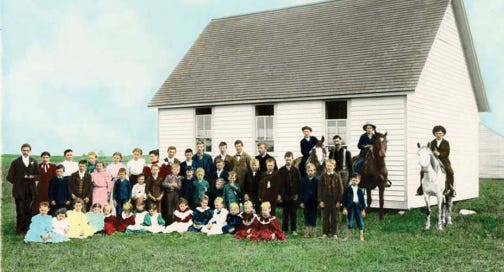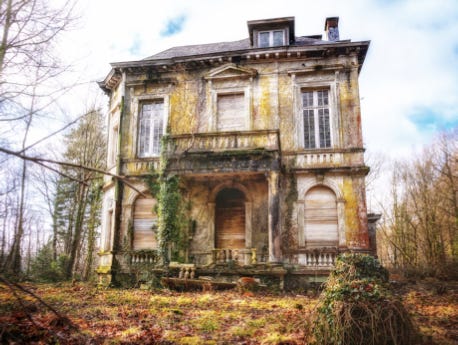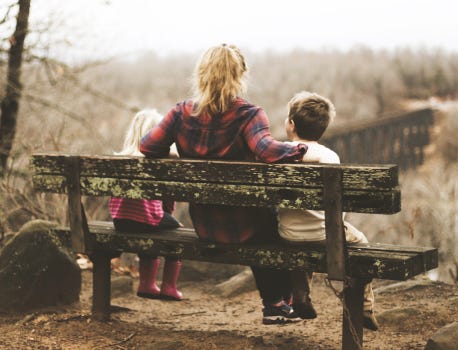Katy: On Children and Poems
Parents who read to their children or sing with them, give them the gift of language, of love and of time that will affect the kind of people they become.
When my mother, Katy, was a girl in the 1920s, the education to be found in a small, rural North Dakota schoolhouse included regular memorization of classic poetry for all students. Older children would select a long poem like Hiawatha by Henry Wadsworth Longfellow, My Shadow by Robert Louis Stevenson, When the Frost is on the Punkin by James Whitcomb Riley. The younger ones might commit to memory a nursery rhyme or a short piece from A Child’s Garden of Verses. Ultimately, they would be expected to stand in front of a class or assembly of parents to recite.
My mother memorized many poems during her eight years at Rich Valley School, and remembered many of them right up into her nineties. She told them to us so often when we were young, I admit I can recite some of them myself.
Sitting on our old raggedy chintz couch on Sunday afternoons with mama, or sometimes when she tucked us into bed, she would tell us stories about her childhood. She would sing old German children’s songs to us about a rooster and a hen ( Ein Hindl und ein Hahn … ) or about the school master who played a fiddle ( Der Schulmeister mit der Fiedel). We got so we could sing along with her, though we had no idea what the words meant and only pronounced them phonologically. She would often recite one of her long-ago memorized poems. Oh, I suspect she left out a few verses and turned around a few words, but she shared them with fervor and emotion, and we were captivated.
Parents who read to their children, who participate in word-play or sing with them, give them such a great gift — the gift of language, of love and of time that will affect, in a positive way, the kind of people they will become. Of course, in her generation there were no televisions, no electronic games, no cell phones to keep children occupied. Entertainment and education were to be found outdoors and through the interaction with and inspiration of our parents. We were all the richer for it, I am sure.
Here are two of my mama’s favorites, and yes, I admit, I get tears in my eyes when I recite them even now, remembering how close I was to her. I have omitted a few stanzas here, as these two lovely old poems are quite long. I encourage you to read them aloud to better feel the rhythm and the sentiment.
The House With Nobody In It
by Joyce Kilmer
Whenever I walk to Suffern along the Erie track
I go by a poor old farmhouse with its shingles broken and black.
I suppose I’ve passed it a hundred times, but I always stop for a minute
And look at the house, the tragic house, the house with nobody in it.This house on the road to Suffern needs a dozen panes of glass,
And somebody ought to weed the walk and take a scythe to the grass.
It needs new paint and shingles, and the vines should be trimmed and tied;
But what it needs the most of all is some people living inside.If I had a lot of money and all my debts were paid
I’d put a gang of men to work with brush and saw and spade.
I’d buy that place and fix it up the way it used to be
And I’d find some people who wanted a home and give it to them free.A house that has done what a house should do, a house that has sheltered life,
That has put its loving wooden arms around a man and his wife,
A house that has echoed a baby’s laugh and held up his stumbling feet,
Is the saddest sight, when it’s left alone, that ever your eyes could meet.So whenever I walk to Suffern along the Erie track
I never go by the empty house without stopping and looking back,
Yet it hurts me to look at the crumbling roof and the shutters fallen apart,
For I can’t help thinking the poor old house is a house with a broken heart.
The Children's Hour
by Henry Wadsworth Longfellow
Between the dark and the daylight,
When the night is beginning to lower,
Comes a pause in the day's occupations,
That is known as the Children's Hour.
I hear in the chamber above me
The patter of little feet,
The sound of a door that is opened,
And voices soft and sweet.
From my study I see in the lamplight,
Descending the broad hall stair,
Grave Alice and laughing Allegra,
And Edith with golden hair.
A whisper, and then a silence:
Yet I know by their merry eyes
They are plotting and planning together
To take me by surprise.
A sudden rush from the stairway,
A sudden raid from the hall!
By three doors left unguarded
They enter my castle wall!
They climb up into my turret
O'er the arms and back of my chair;
If I try to escape, they surround me;
They seem to be everywhere.
I have you fast in my fortress,
And will not let you depart,
But put you down into the dungeon
In the round-tower of my heart.
And there will I keep you forever,
Yes, forever and a day,
Till the walls shall crumble to ruin,
And moulder in dust away!








You are so right Sharron, the gift of language opens up the whole world to children. I love the poems. So much easier to memorize when they have rhyme and rhythm. Lovely piece!
Another great story about your mother. I remember my mother reading Winnie the Pooh and Chitty Chitty Bang Bang to me. I found a copy of Chitty Chitty Bang Bang on Amazon and read it to my daughter.